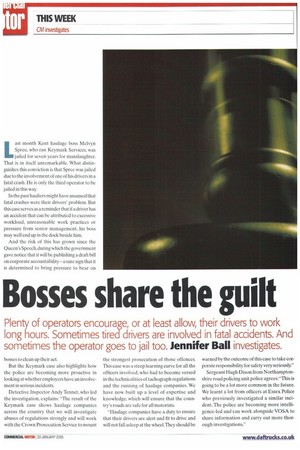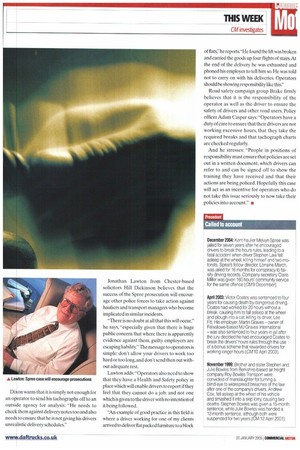Bosses share the guilt
Page 28

Page 29

If you've noticed an error in this article please click here to report it so we can fix it.
Plenty of operators encourage, or at least allow, their drivers to work long hours. Sometimes tired drivers are involved in fatal accidents. And
sometimes the operator goes to jail too. Jennifer Ball investigates. Last month Kent haulage boss Melvyn Spree, who ran Keymark Services, was jailed for seven years for manslaughter. That is in itself unremarkable. What distinguishes this conviction is that Spree was jailed due to the involvement of one of his drivers in a fatal crash. He is only the third operator to be jailed in this way.
In the past hauliers might have assumed that fatal crashes were their drivers' problem. But this case serves as a reminder that if a driver has an accident that can be attributed to excessive workload, unreasonable work practices or pressure from senior management, his boss may well end up in the dock beside him.
And the risk of this has grown since the Queen's Speech, during which the government gave notice that it will be publishing a draft bill on corporate accountability — a sure sign that it is determined to bring pressure to bear on bosses to clean up their act.
But the Keymark case also highlights how the police are becoming more proactive in looking at whether employers have an involvement in serious incidents.
Detective Inspector Andy Tennet, who led the investigation, explains: "The result of the Keymark case shows haulage companies across the country that we will investigate abuses of regulations strongly and will work with the Crown Prosecution Service to mount the strongest prosecution of those offences. This case was a steep learning curve for all the officers involved, who had to become versed in the technicalities of tachograph regulations and the running of haulage companies. We have now built up a level of expertise and knowledge, which will ensure that the country's roads are safe for all motorists.
"Haulage companies have a duty to ensure that their drivers are alert and fit to drive and will not fall asleep at the wheel.They should be warned by the outcome of this case to take corporate responsibility for safety very seriously."
Sergeant Hugh Dixon from Northamptonshire road policing unit police agrees: "This is going to be a lot more common in the future. We learnt a lot from officers at Essex Police who previously investigated a similar incident. The police are becoming more intelligence-led and can work alongside VOSA to share information and carry out more thorough investigations." Dixon warns that it is simply not enough for an operator to send his tachographs off to an outside agency for analysis: "He needs to check them against delivery notes too and also needs to ensure that he is not giving his drivers unrealistic delivery schedules." Jonathan Lawton from Chester-based solicitors Hill Dickinson believes that the success of the Spree prosecution will encourage other police forces to take action against hauliers and transport managers who become implicated in similar incidents.
"There is no doubt at all that this will occur," he says, "especially given that there is huge public concern that where there is apparently evidence against them, guilty employers are escaping liability." The message to operators is simple: don't allow your drivers to work too hard or too long, and don't send then out without adequate rest.
Lawton adds:"Operators also need to show that they have a Health and Safety policy in place which will enable drivers to report if they feel that they cannot do a job; and not one which is Oven to the driver with no intention of it being followed.
"An example of good practice in this field is where a driver working for one of my clients arrived to deliver flat packed furniture to a block of flats," he reports."He found the lift was broken and carried the goods up four flights of stairs. At the end of the delivery he was exhausted and phoned his employer to tell him so. He was told not to carry on with his deliveries. Operators should be showing responsibility like this."
Road safety campaign group Brake firmly believes that it is the responsibility of the operator as well as the driver to ensure the safety of drivers and other road users. Policy officer Adam Caspar says: "Operators have a duty of care to ensure that their drivers are not working excessive hours, that they take the required breaks and that tachograph charts are checked regularly.
And he stresses: "People in positions of responsibility must ensure that policies are set out in a written document, which drivers can refer to and can be signed off to show the training they have received and that their actions are being policed. Hopefully this case will act as an incentive for operators who do not take this issue seriously to now take their policies into account." •












































































































































































































